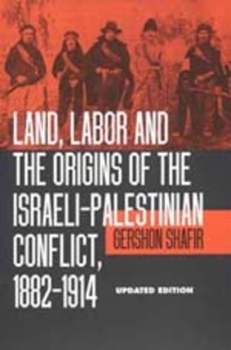Land, Labor and the Origins of the Israeli-Palestinian Conflict, 1882-1914
Select Format
Select Condition 
Book Overview
Gershon Shafir challenges the heroic myths about the foundation of the State of Israel by investigating the struggle to control land and labor during the early Zionist enterprise. He argues that it was not the imported Zionist ideas that were responsible for the character of the Israeli state, but the particular conditions of the local conflict between the European "settlers" and the Palestinian Arab population.
Format:Paperback
Language:English
ISBN:0520204018
ISBN13:9780520204010
Release Date:August 1996
Publisher:University of California Press
Length:288 Pages
Weight:1.00 lbs.
Dimensions:0.9" x 6.0" x 9.0"
Customer Reviews
3 ratings
Interesting history, but still lacks something
Published by Thriftbooks.com User , 20 years ago
Gershon Shafir published this book in 1996 through University of California Press. Certainly it is a major contribution to undersatnding the fundamental problems of any attempt at a settlemen in Israel/Palestine. Working in the same vein as Benny Morris, Tom Segev, Ilan Pape, and other "new" historians (the name is used in both praise and derision), Shafir crafted an impressive work that attempted to cut through Zionist and Palestinian myths and examine what truly happened from 1882-1914. However, after all his impressive research, readers feel like there may be more to the story than written.After a comparison and contrast of different styles of colonialism (he asserts that Zionism can best be understood as a form of colonialism), he reviews Zionist land policies. For Shafir, agriculture and the land is the root of Israeli-Palestinian conflict. While this is certainly a hugely important issue, he neglects the urban roots of conflict in favor of his agricultural theories. Ironically, this only furthers the myth of Israelis returning to the land, whereas most future Israelis lived in cities. Without examining the urban aspects of the conflict, he only tells part of the story. Also, his work is Ashkenazi-centric (European Jewish). True, the leaders of Zionism were mostly Central/Eastern European during this period, but he virtually marginalizes the story of other Zionists.Nevertheless, Shafir's contribution to the academic literature as it offers a glimpse into the agricultural roots that contributed to the modern conflict.
Excellent treatment
Published by Thriftbooks.com User , 26 years ago
This is an excellent examination of the economic forces that have shaped the conflict in Palestine/Israel.
Outstanding economic explanation of the conflict
Published by Thriftbooks.com User , 26 years ago
This is an example of a revisionist argument at its best. Gershon Shafir uses the same primary sources the major Middle-East historians have used for decades and offers up an economic, non-religious, and elegantly simple explanation of the conflict as it exists today.






